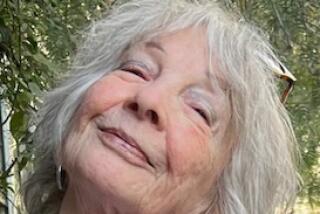Joan Palevsky, 80; Millionaire With a Gift of Modesty
- Share via
At a 1986 gala honoring feminists, Gloria Steinem described Joan Palevsky, aptly and simply, as a “woman of resources.”
Drawing from a considerable fortune, Palevsky contributed to a long list of individuals and organizations in the city, and to “every progressive woman candidate in the state and nation,” one friend said.
Such generosity led Steinem to praise Palevsky in front of an audience at the Beverly Hills Hotel as the first woman philanthropist to use her means to support feminist issues.
To that praise, Palevsky remarked: “Oh, shucks.”
Palevsky, a modest multimillionaire and academic who favored button-down shirts and blazers, and frequently contributed book reviews to The Times, died Tuesday at UCLA Medical Center. She was 80.
The cause of death was emphysema, said her daughter, Madeleine Moskowitz.
Palevsky was intensely private and her outward appearance and manner belied her wealth. She drove a modest car, often wore no jewelry and was not one to spend a great deal of time with her hair or nails.
“Do I look ritzy?” she asked a Times reporter in a 1983 interview. Ritziness “is not my nature. Maybe I’m just a serious person. I think I am, underneath it all.”
Although she did not look the part of a multimillionaire, she played the role of a philanthropist well. By the 1980s, she had established herself as a major contributor in a city where the bar for such distinction is high. The benefactors included the Rape Treatment Center, Los Angeles County Museum of Art, UCLA, Childrens Hospital, Democratic candidates, women candidates and feminist organizations.
In 1973, Palevsky’s wealth helped build the collection and establish the reputation of the Los Angeles County Museum of Art in the field of Islamic art. That year, she purchased a comprehensive collection of Islamic works, about 650 pieces produced in Middle Eastern countries from 700 to 1900.
“It catapulted LACMA’s standing into a major repository for Islamic art that has continued to grow over recent decades,” said Nancy Thomas, deputy director of the museum, where Palevsky served as a trustee from 1973 to 1979 and as vice president of the board from 1978 to 1979.
Of her many passions, helping “to get more women elected and make it easier to raise money for them” was a self-proclaimed crusade for Palevsky, who was active in Women For:, which bills itself as the city’s oldest political action committee for women.
Palevsky was the kind of friend any woman seeking office wanted to have, said Jane Hasler Henick, former state president of the National Women’s Political Caucus of California, which also received Palevsky’s contributions.
“That’s who she was ... helping people who needed help. She saw that women running for office needed help.”
Though she would possess considerable wealth, Palevsky grew up in the Depression. She was born Feb. 23, 1926, in Omaha and grew up in Los Angeles. She was the daughter of a single mother and an absent father.
She graduated from UCLA, earned a master’s degree in French from the University of Wisconsin, then returned to Westwood, teaching at her alma mater from 1949 to 1956.
Palevsky was the former wife of Max Palevsky, who in 1969 sold his 6-year-old firm, Scientific Data Systems, to Xerox for $1 billion and was later a founder and director of Intel Corp.
The couple married in 1952 after meeting at UCLA and divorced in 1968. In addition to her daughter, Palevsky is survived by son Nicholas Palevsky; a son-in-law, Jeffrey Moskowitz; and three grandchildren.
Palevsky’s generosity extended to Price Chapel African Methodist Episcopal Church, where her decades-long friend and housekeeper is a member.
“She and my mother were very, very close,” Moskowitz said. “She got very involved in the church and their good works.”
In some cases, Palevsky gave to individuals outside the political arena who were simply in need. Many times she gave anonymously, said friend Mary Lou Whitmore. “I don’t think I knew anybody else [who] was that generous and didn’t want any credit for it at all,” Whitmore said.
In 1983, at the age of 57, Palevsky was finally working in what she called her dream job at Immaculate Heart Center, supervising research.
Palevsky’s passions included languages and books. In the 1970s, she was a frequent contributor to The Times, with reviews of books on Gertrude Stein, French writer Violette Leduc and George Sand, the pen name of Amandine-Aurore-Lucile Dupin. Of the Sand book, Palevsky wrote: “One finishes the book with affection for this generous woman, who embodied before Freud his dictum ‘love and work.’ ”
For all the high-mindedness of her work, friends said Palevsky could take things lightly.
In 1983 Palevsky half-jokingly told an interviewer that she had “never gotten over Adlai Stevenson’s defeat.” She was a supporter of Sen. Alan Cranston and though she once said that she liked former President Carter, she called the race wrong.
“I’m the one that was so astute that I had breakfast with Jimmy Carter and said, ‘I enjoyed being with him, but I don’t think he’ll go anywhere.’ ”


